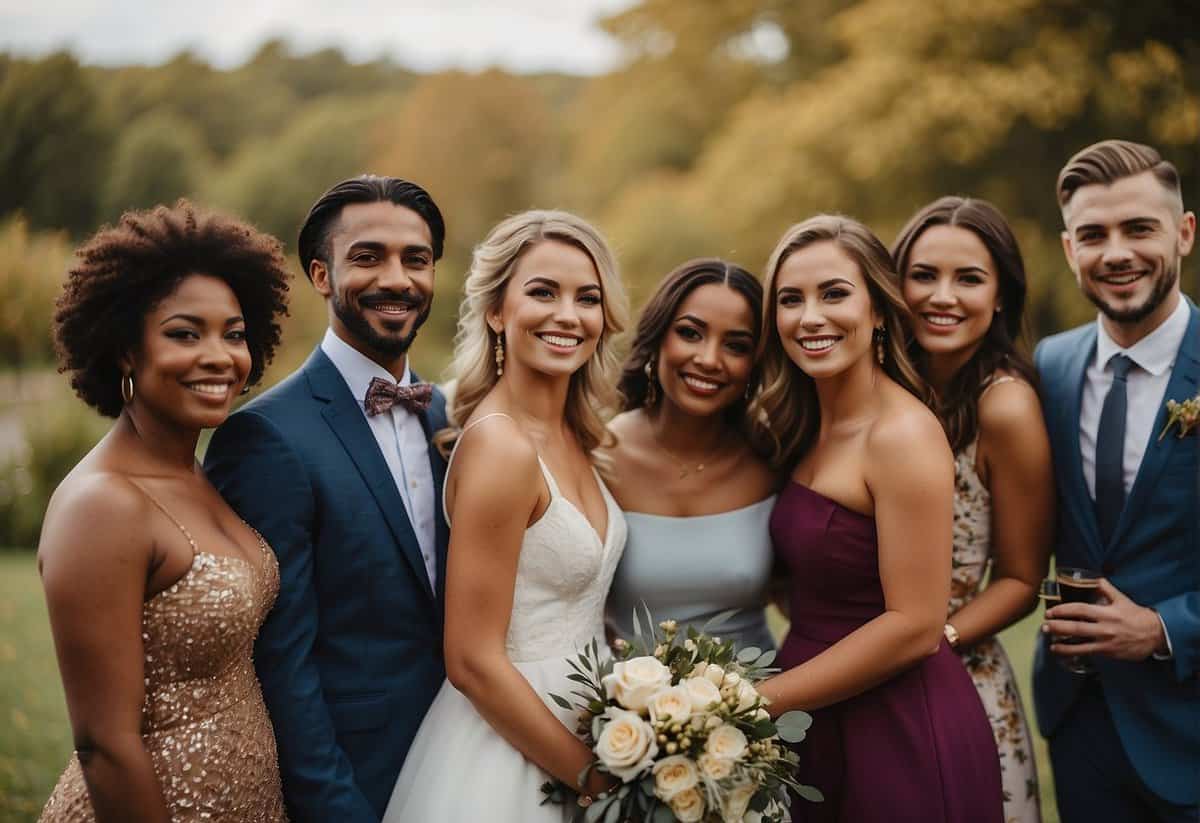Is it Rude Not to Invite Someone to Your Wedding? Understanding Guest List Etiquette
Deciding on a wedding guest list can be an incredibly challenging part of planning your big day. Weddings are personal events, and it’s natural to want to share the moment with close friends and family. However, constraints such as budget, venue capacity, and the dynamics of relationships often make it impossible to invite everyone. The idea of not inviting certain individuals, particularly when it concerns family or friends, is a sensitive topic that stirs up questions about etiquettes and feelings.

Whether or not it is rude to leave someone off your wedding guest list depends on several factors. You may feel obligated to extend an invitation to avoid hurting feelings, despite practical limitations or personal preferences. The undeniable truth is that your wedding day is about celebrating your love and commitment, and it’s crucial your decisions are considerate, inclusive, and authentic to you. It’s possible to handle your wedding invitations—and the inevitable exclusions—with grace and sensitivity.
Key Takeaways
Personal factors and event limitations influence the wedding guest list.
Etiquette guides handling invitations diplomatically.
It’s important to prioritize authenticity and inclusivity in your decisions.
Understanding Wedding Etiquette

When planning your wedding, understanding the subtleties of proper etiquette, especially pertaining to the guest list and invitations, is crucial for ensuring a smooth path to your special day.
Guest List Fundamentals
Creating a guest list for your wedding is a delicate balance between personal preference and traditional etiquette. Here’s what you need to know:
- Family First: Typically, immediate family members are the first to make the list. However, it’s your wedding; you have the freedom to choose.
- Circle of Friends: It’s natural to want to invite your close friends, but consider the size of your wedding before extending invitations to wider social circles.
- Professional Boundaries: Deciding whether to invite coworkers can be tricky. If you can’t invite everyone, a private talk explaining the limited guest list may help ease any tension.
- Plus-Ones: Offering a plus-one is common courtesy for single guests, particularly if they won’t know many other people at your ceremony.
Invitation Etiquette
The invitation is a reflection of both the event and your respect for the invitees. Here’s how you can ensure your invitations are in line with wedding etiquette:
- Early Notices: Send out your invitations well in advance. An early RSVP request gives you and your guests ample time to prepare.
- Clear Information: Ensure all the details of the day are clear—from the specific date and time to the venue and dress code.
- Tactful Non-Invites: If someone is not invited, it’s best to handle their inquiries with tact. Be honest if asked, but there’s no need to offer unsolicited explanations.
- Consistency in Communication: Whether someone is invited or not, if the topic comes up, express genuine regret and emphasize the limitations you’re facing—a small venue, a tight budget, or a desire for an intimate gathering.
Making Considerate Decisions

When it comes to your wedding, navigating guest list creation under budget and venue constraints can be tricky. It’s essential to manage these limitations while preserving personal relationships and developing a celebration that’s true to your vision for an intimate wedding.
Navigating Budget and Venue Limitations
You may have envisioned your dream wedding at a charming venue, but it’s important to remember that venue restrictions and budget constraints often dictate the scale of your event. For instance, if the capacity limits of your chosen venue are strict, or if you’re planning for an intimate wedding with a modest budget, you’ll have to make tough decisions about your wedding guest list. Here’s how you might approach it:
- Prioritize invitations by tiers: Think about creating a list in order of importance—like family members, close friends, and then colleagues.
- Consult professionals: Wedding planners like Nora Sheils of Bridal Bliss suggest cutting the list down in waves to fit money and venue restrictions.
Addressing Personal Relationships
The social intricacies of whom to invite can be the most challenging part. If there’s been a recent falling out with a friend or family member, consider the potential for reconciliation before omitting them from your list. Here are a few strategies:
- Communicate openly: If someone won’t make the cut, find a gentle way to explain the situation, being honest about venue and budget limitations.
- Think of other ways to include: Just because they can’t attend the wedding doesn’t mean you can’t celebrate with them in another way—perhaps a small get-together or a video call during the honeymoon.
By carefully considering each potential wedding guest within the context of these parameters, you can craft a guest list that honors your resources and relationships alike.
Handling Invitations and Responses

Navigating the intricacies of wedding invitations and managing RSVPs requires tact and organization. Your approach will set the tone for your entire event and how your guests perceive your wedding planning process.
Crafting and Sending Wedding Invitations
When creating wedding invitations, it’s essential to reflect the style and tone of your wedding. Ensure you include all the necessary details such as the date, location, and time, and consider adding a link to your wedding website for further information. Here are some guidelines:
- Be Honest: If your venue or budget requires a smaller guest list, it’s okay to explain this to those not invited. Honesty is often appreciated and can minimize hurt feelings.
- Clarity is Key: Clearly state who is invited, especially for plus-ones or families, to avoid any confusion.
- Personal Touch: For close friends and family, consider adding a personal note within the invite, showing appreciation for their support.
When finalizing your invitation design, coordinate with your wedding vendors to ensure your theme is consistent across all elements, including catering menus and decor.
Managing RSVPs and Non-Invites
Responding to RSVPs and handling those not invited can be sensitive, but with the right behavior, you can maintain a friendly atmosphere.
- Organize Your Responses: Keep track of RSVPs through a spreadsheet or your wedding website. This helps with catering numbers and seating arrangements.
- Considerate Responses: If someone declines your invitation, respond kindly and thank them for their consideration. You may visit responding to declines to understand better how to handle different scenarios.
- Non-Invites: If someone inquires about not receiving an invite, be compassionate and honest. Share your reasons in a private conversation if necessary, but stay polite and understanding. Further advice can be found on handling non-invites.
Remember, it’s your wedding and ultimately your decision on whom to invite. While you can’t control everyone’s reactions, you can control how you handle them, which can leave a lasting positive impression. If guests inquire about gifts, a simple guideline is to express that presents are appreciated but not required.
Incorporating Alternatives and Inclusivity

As you plan your special day, remember that ensuring everyone feels included can be achieved through creative methods and alternative forms of involvement.
Creative Ways to Extend the Celebration
If you can’t invite everyone to the main event, think about hosting an additional, more casual get-together. This could be a post-wedding picnic or a casual brunch where you can extend the festivities. Websites like Zola offer resources for managing invitations and event details, which can be particularly useful for coordinating these extra celebrations smoothly.
For Destination Weddings:
- Plan a local reception upon your return.
- Host a virtual tour of your destination for those who couldn’t attend.
Alternative Forms of Participation
Not all guests have to be physically present to play a part in your wedding. For those unable to attend, consider:
- Live stream your ceremony, allowing distant loved ones to join in real-time.
- Have a wedding website where guests can upload video messages of support and friendship.
Alternative Show of Support:
- Invite absent relatives and friends to contribute a recipe or a song to the wedding.
- Suggest a collective wedding gift like funding for a honeymoon experience, which can be organized through a wedding planner or a dedicated website.
Frequently Asked Questions

Deciding who to invite to your wedding can be a delicate balancing act. It’s important to approach this aspect of wedding planning with a clear understanding of etiquette and tact to avoid unintentional hurt feelings.
How do I handle not inviting certain people to my wedding?
Start by creating a well-thought-out guest list that aligns with your venue capacity, budget, and personal preferences. If someone inquires about the invitation, be honest and explain that due to constraints, you had to make tough choices. If you need guidance on crafting your guest list, The Knot offers insights on wedding invitation etiquette.
How can I explain to someone why they’re not invited to my wedding?
Be compassionate and direct when speaking with someone who’s not invited. Address the matter privately, maybe in person or through a phone call. Assure them that your decision was based on logistical factors, not personal ones. WeddingWire has resources addressing common wedding etiquette questions that can help with these conversations.
What is the etiquette for inviting guests to wedding ceremonies but not the reception?
This practice is generally acceptable, especially for larger ceremonies or intimate receptions. Clearly communicate your plans on the invitation to set the right expectations and avoid misunderstandings. Zola provides advice regarding potentially sensitive scenarios like not inviting family to your wedding.
Should I feel obligated to invite someone to my wedding because they invited me to theirs?
Wedding invitations are not reciprocal obligations. Extend invitations based on your current relationship with the person, not out of a sense of duty. Feel empowered to make choices that best suit your wedding, regardless of past invitations you’ve received.
How should parents determine whether to invite their own friends to their child’s wedding?
Parents should discuss with their children which friends they feel are important to include. It’s crucial to respect the couple’s wishes and the scope of the wedding, blending both the parents’ social circles and the couple’s guest list harmoniously.
What are polite ways to inform guests that their partners are not invited to the wedding?
If you are not extending a ‘plus-one’ option, address the wedding invitation to the individual explicitly. In scenarios where a guest might assume they can bring a partner, have a candid conversation early to clarify the situation. Vogue discusses navigating these delicate situations and more in their article on wedding invite etiquette.



